The Detrimental Effects of Stigma on Mental Illness Recovery
VerifiedAdded on 2022/12/27
|6
|1639
|48
Essay
AI Summary
This essay delves into the significant impact of stigma on the recovery process of individuals suffering from mental illnesses. It highlights how societal prejudice, discrimination, and negative perceptions create substantial barriers to treatment and overall well-being. The paper explores various facets of stigma, including social stigma, structural discrimination, and self-stigma, and their effects on employment, relationships, and access to mental health services. It emphasizes that stigma leads to feelings of shame, isolation, and hopelessness, which often deter individuals from seeking help or adhering to treatment plans. The essay underscores the critical need to address and mitigate stigma to facilitate more effective recovery outcomes, promoting early intervention, and fostering supportive environments for those affected by mental illness. It concludes by emphasizing the negative influence of stigma on all aspects of the lives of mentally ill patients.
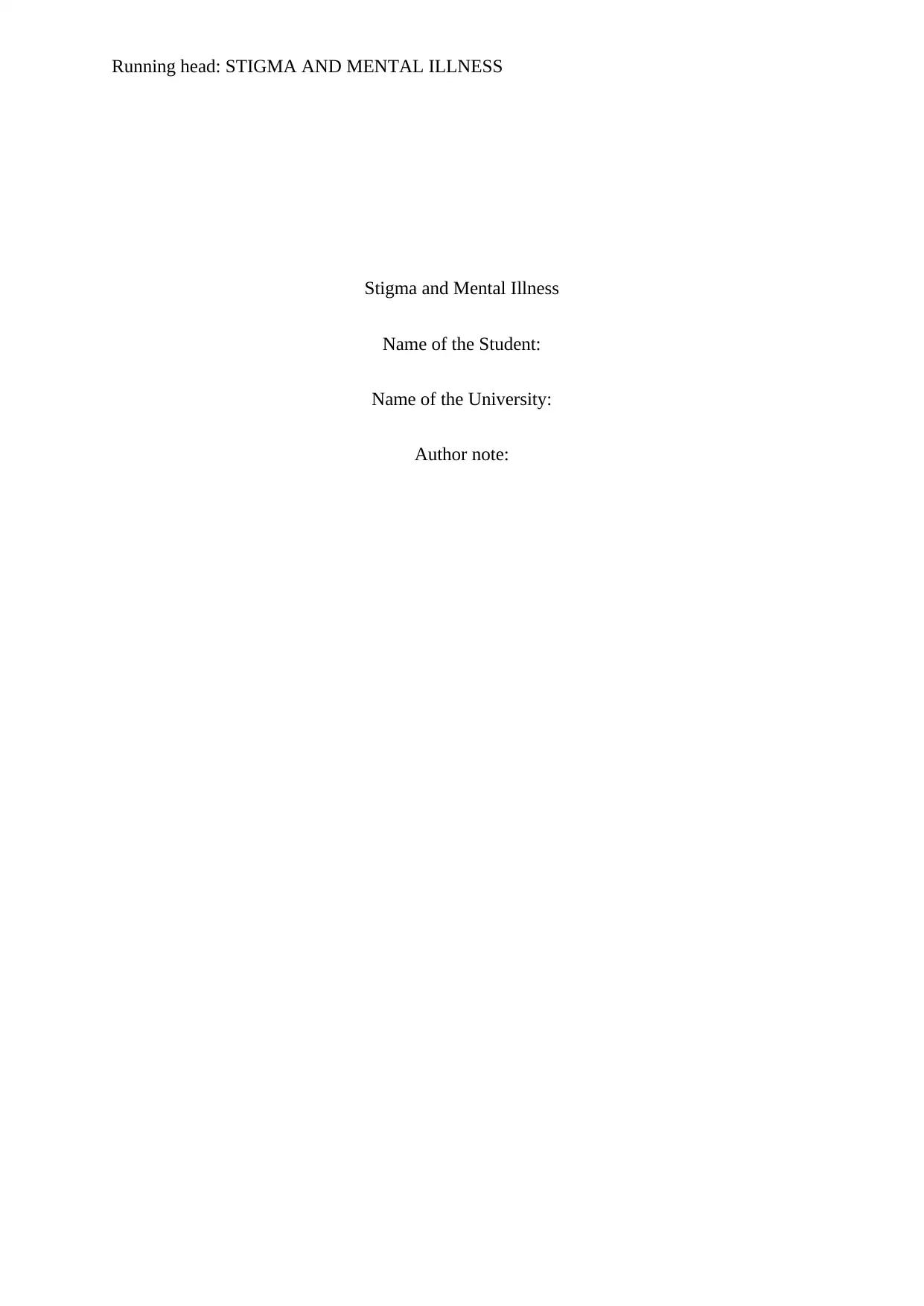
Running head: STIGMA AND MENTAL ILLNESS
Stigma and Mental Illness
Name of the Student:
Name of the University:
Author note:
Stigma and Mental Illness
Name of the Student:
Name of the University:
Author note:
Paraphrase This Document
Need a fresh take? Get an instant paraphrase of this document with our AI Paraphraser
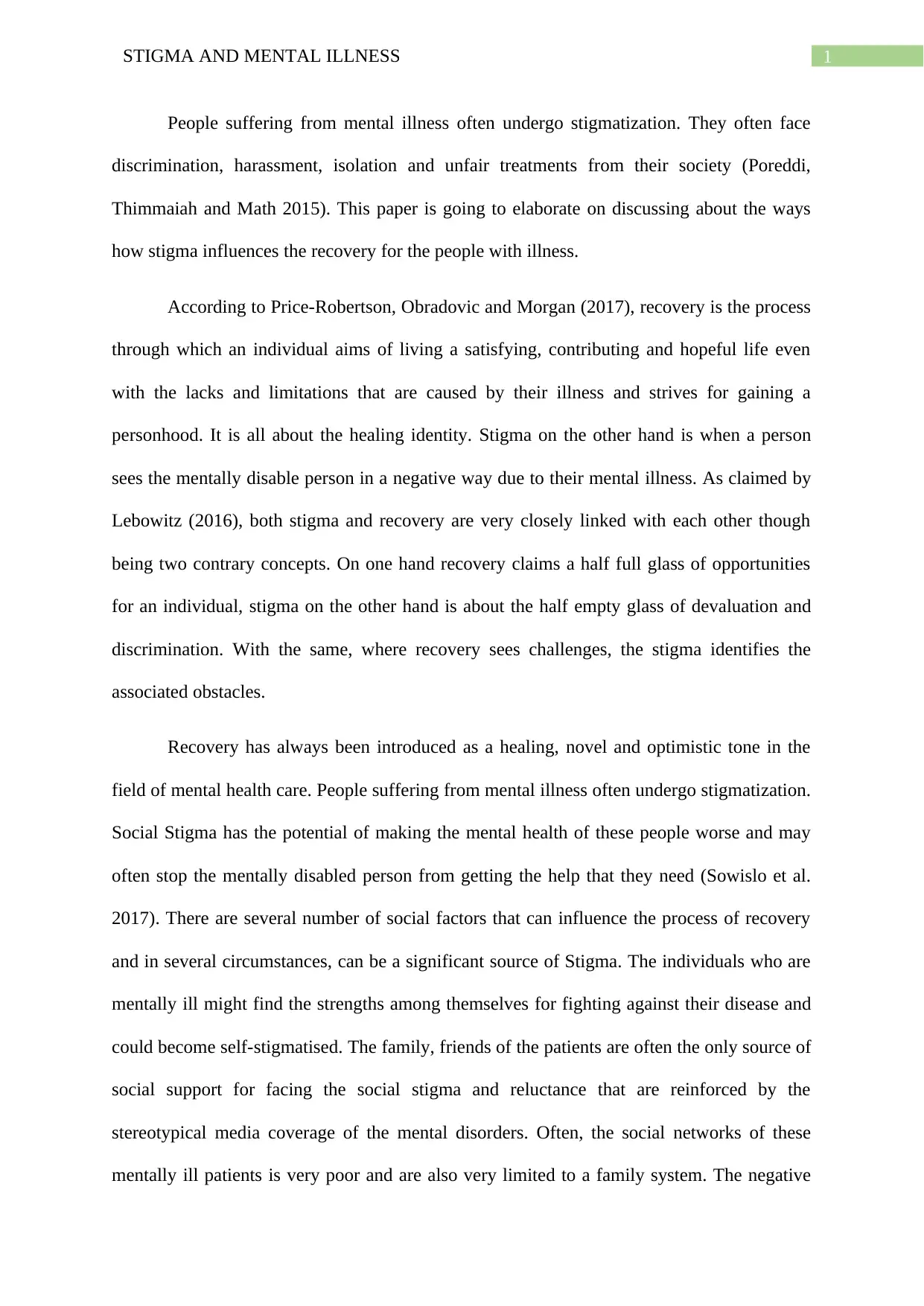
1STIGMA AND MENTAL ILLNESS
People suffering from mental illness often undergo stigmatization. They often face
discrimination, harassment, isolation and unfair treatments from their society (Poreddi,
Thimmaiah and Math 2015). This paper is going to elaborate on discussing about the ways
how stigma influences the recovery for the people with illness.
According to Price-Robertson, Obradovic and Morgan (2017), recovery is the process
through which an individual aims of living a satisfying, contributing and hopeful life even
with the lacks and limitations that are caused by their illness and strives for gaining a
personhood. It is all about the healing identity. Stigma on the other hand is when a person
sees the mentally disable person in a negative way due to their mental illness. As claimed by
Lebowitz (2016), both stigma and recovery are very closely linked with each other though
being two contrary concepts. On one hand recovery claims a half full glass of opportunities
for an individual, stigma on the other hand is about the half empty glass of devaluation and
discrimination. With the same, where recovery sees challenges, the stigma identifies the
associated obstacles.
Recovery has always been introduced as a healing, novel and optimistic tone in the
field of mental health care. People suffering from mental illness often undergo stigmatization.
Social Stigma has the potential of making the mental health of these people worse and may
often stop the mentally disabled person from getting the help that they need (Sowislo et al.
2017). There are several number of social factors that can influence the process of recovery
and in several circumstances, can be a significant source of Stigma. The individuals who are
mentally ill might find the strengths among themselves for fighting against their disease and
could become self-stigmatised. The family, friends of the patients are often the only source of
social support for facing the social stigma and reluctance that are reinforced by the
stereotypical media coverage of the mental disorders. Often, the social networks of these
mentally ill patients is very poor and are also very limited to a family system. The negative
People suffering from mental illness often undergo stigmatization. They often face
discrimination, harassment, isolation and unfair treatments from their society (Poreddi,
Thimmaiah and Math 2015). This paper is going to elaborate on discussing about the ways
how stigma influences the recovery for the people with illness.
According to Price-Robertson, Obradovic and Morgan (2017), recovery is the process
through which an individual aims of living a satisfying, contributing and hopeful life even
with the lacks and limitations that are caused by their illness and strives for gaining a
personhood. It is all about the healing identity. Stigma on the other hand is when a person
sees the mentally disable person in a negative way due to their mental illness. As claimed by
Lebowitz (2016), both stigma and recovery are very closely linked with each other though
being two contrary concepts. On one hand recovery claims a half full glass of opportunities
for an individual, stigma on the other hand is about the half empty glass of devaluation and
discrimination. With the same, where recovery sees challenges, the stigma identifies the
associated obstacles.
Recovery has always been introduced as a healing, novel and optimistic tone in the
field of mental health care. People suffering from mental illness often undergo stigmatization.
Social Stigma has the potential of making the mental health of these people worse and may
often stop the mentally disabled person from getting the help that they need (Sowislo et al.
2017). There are several number of social factors that can influence the process of recovery
and in several circumstances, can be a significant source of Stigma. The individuals who are
mentally ill might find the strengths among themselves for fighting against their disease and
could become self-stigmatised. The family, friends of the patients are often the only source of
social support for facing the social stigma and reluctance that are reinforced by the
stereotypical media coverage of the mental disorders. Often, the social networks of these
mentally ill patients is very poor and are also very limited to a family system. The negative
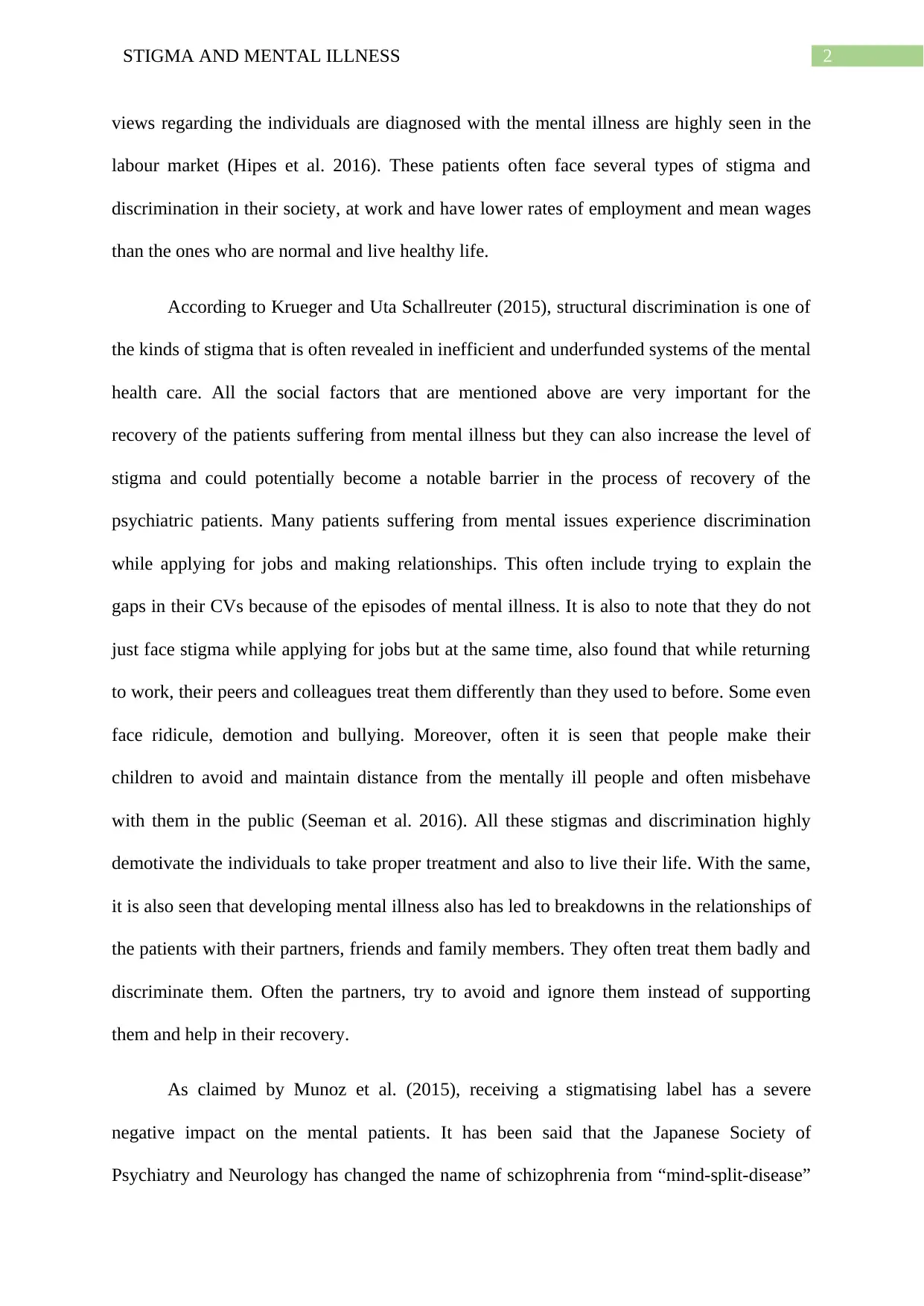
2STIGMA AND MENTAL ILLNESS
views regarding the individuals are diagnosed with the mental illness are highly seen in the
labour market (Hipes et al. 2016). These patients often face several types of stigma and
discrimination in their society, at work and have lower rates of employment and mean wages
than the ones who are normal and live healthy life.
According to Krueger and Uta Schallreuter (2015), structural discrimination is one of
the kinds of stigma that is often revealed in inefficient and underfunded systems of the mental
health care. All the social factors that are mentioned above are very important for the
recovery of the patients suffering from mental illness but they can also increase the level of
stigma and could potentially become a notable barrier in the process of recovery of the
psychiatric patients. Many patients suffering from mental issues experience discrimination
while applying for jobs and making relationships. This often include trying to explain the
gaps in their CVs because of the episodes of mental illness. It is also to note that they do not
just face stigma while applying for jobs but at the same time, also found that while returning
to work, their peers and colleagues treat them differently than they used to before. Some even
face ridicule, demotion and bullying. Moreover, often it is seen that people make their
children to avoid and maintain distance from the mentally ill people and often misbehave
with them in the public (Seeman et al. 2016). All these stigmas and discrimination highly
demotivate the individuals to take proper treatment and also to live their life. With the same,
it is also seen that developing mental illness also has led to breakdowns in the relationships of
the patients with their partners, friends and family members. They often treat them badly and
discriminate them. Often the partners, try to avoid and ignore them instead of supporting
them and help in their recovery.
As claimed by Munoz et al. (2015), receiving a stigmatising label has a severe
negative impact on the mental patients. It has been said that the Japanese Society of
Psychiatry and Neurology has changed the name of schizophrenia from “mind-split-disease”
views regarding the individuals are diagnosed with the mental illness are highly seen in the
labour market (Hipes et al. 2016). These patients often face several types of stigma and
discrimination in their society, at work and have lower rates of employment and mean wages
than the ones who are normal and live healthy life.
According to Krueger and Uta Schallreuter (2015), structural discrimination is one of
the kinds of stigma that is often revealed in inefficient and underfunded systems of the mental
health care. All the social factors that are mentioned above are very important for the
recovery of the patients suffering from mental illness but they can also increase the level of
stigma and could potentially become a notable barrier in the process of recovery of the
psychiatric patients. Many patients suffering from mental issues experience discrimination
while applying for jobs and making relationships. This often include trying to explain the
gaps in their CVs because of the episodes of mental illness. It is also to note that they do not
just face stigma while applying for jobs but at the same time, also found that while returning
to work, their peers and colleagues treat them differently than they used to before. Some even
face ridicule, demotion and bullying. Moreover, often it is seen that people make their
children to avoid and maintain distance from the mentally ill people and often misbehave
with them in the public (Seeman et al. 2016). All these stigmas and discrimination highly
demotivate the individuals to take proper treatment and also to live their life. With the same,
it is also seen that developing mental illness also has led to breakdowns in the relationships of
the patients with their partners, friends and family members. They often treat them badly and
discriminate them. Often the partners, try to avoid and ignore them instead of supporting
them and help in their recovery.
As claimed by Munoz et al. (2015), receiving a stigmatising label has a severe
negative impact on the mental patients. It has been said that the Japanese Society of
Psychiatry and Neurology has changed the name of schizophrenia from “mind-split-disease”
⊘ This is a preview!⊘
Do you want full access?
Subscribe today to unlock all pages.

Trusted by 1+ million students worldwide
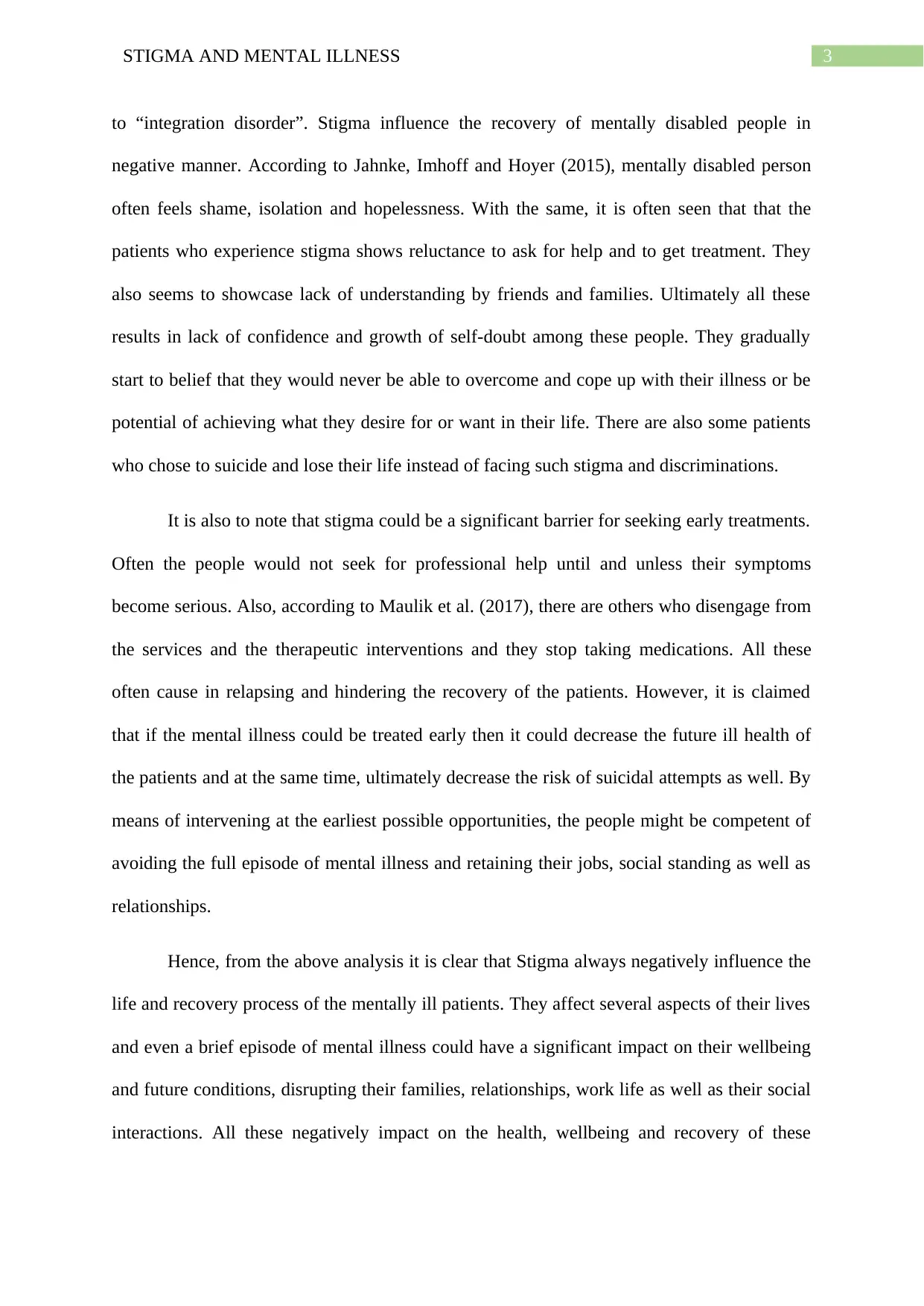
3STIGMA AND MENTAL ILLNESS
to “integration disorder”. Stigma influence the recovery of mentally disabled people in
negative manner. According to Jahnke, Imhoff and Hoyer (2015), mentally disabled person
often feels shame, isolation and hopelessness. With the same, it is often seen that that the
patients who experience stigma shows reluctance to ask for help and to get treatment. They
also seems to showcase lack of understanding by friends and families. Ultimately all these
results in lack of confidence and growth of self-doubt among these people. They gradually
start to belief that they would never be able to overcome and cope up with their illness or be
potential of achieving what they desire for or want in their life. There are also some patients
who chose to suicide and lose their life instead of facing such stigma and discriminations.
It is also to note that stigma could be a significant barrier for seeking early treatments.
Often the people would not seek for professional help until and unless their symptoms
become serious. Also, according to Maulik et al. (2017), there are others who disengage from
the services and the therapeutic interventions and they stop taking medications. All these
often cause in relapsing and hindering the recovery of the patients. However, it is claimed
that if the mental illness could be treated early then it could decrease the future ill health of
the patients and at the same time, ultimately decrease the risk of suicidal attempts as well. By
means of intervening at the earliest possible opportunities, the people might be competent of
avoiding the full episode of mental illness and retaining their jobs, social standing as well as
relationships.
Hence, from the above analysis it is clear that Stigma always negatively influence the
life and recovery process of the mentally ill patients. They affect several aspects of their lives
and even a brief episode of mental illness could have a significant impact on their wellbeing
and future conditions, disrupting their families, relationships, work life as well as their social
interactions. All these negatively impact on the health, wellbeing and recovery of these
to “integration disorder”. Stigma influence the recovery of mentally disabled people in
negative manner. According to Jahnke, Imhoff and Hoyer (2015), mentally disabled person
often feels shame, isolation and hopelessness. With the same, it is often seen that that the
patients who experience stigma shows reluctance to ask for help and to get treatment. They
also seems to showcase lack of understanding by friends and families. Ultimately all these
results in lack of confidence and growth of self-doubt among these people. They gradually
start to belief that they would never be able to overcome and cope up with their illness or be
potential of achieving what they desire for or want in their life. There are also some patients
who chose to suicide and lose their life instead of facing such stigma and discriminations.
It is also to note that stigma could be a significant barrier for seeking early treatments.
Often the people would not seek for professional help until and unless their symptoms
become serious. Also, according to Maulik et al. (2017), there are others who disengage from
the services and the therapeutic interventions and they stop taking medications. All these
often cause in relapsing and hindering the recovery of the patients. However, it is claimed
that if the mental illness could be treated early then it could decrease the future ill health of
the patients and at the same time, ultimately decrease the risk of suicidal attempts as well. By
means of intervening at the earliest possible opportunities, the people might be competent of
avoiding the full episode of mental illness and retaining their jobs, social standing as well as
relationships.
Hence, from the above analysis it is clear that Stigma always negatively influence the
life and recovery process of the mentally ill patients. They affect several aspects of their lives
and even a brief episode of mental illness could have a significant impact on their wellbeing
and future conditions, disrupting their families, relationships, work life as well as their social
interactions. All these negatively impact on the health, wellbeing and recovery of these
Paraphrase This Document
Need a fresh take? Get an instant paraphrase of this document with our AI Paraphraser
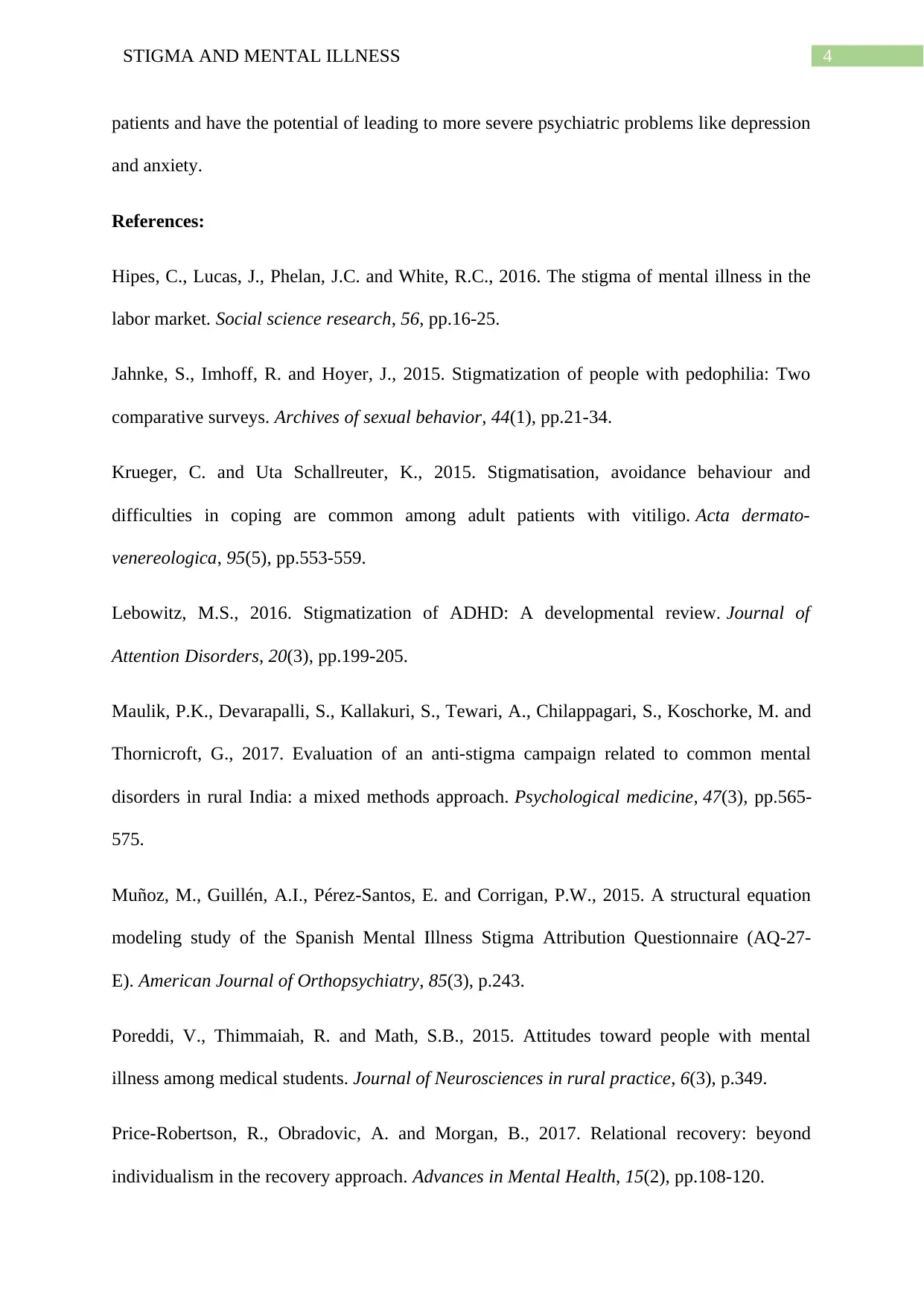
4STIGMA AND MENTAL ILLNESS
patients and have the potential of leading to more severe psychiatric problems like depression
and anxiety.
References:
Hipes, C., Lucas, J., Phelan, J.C. and White, R.C., 2016. The stigma of mental illness in the
labor market. Social science research, 56, pp.16-25.
Jahnke, S., Imhoff, R. and Hoyer, J., 2015. Stigmatization of people with pedophilia: Two
comparative surveys. Archives of sexual behavior, 44(1), pp.21-34.
Krueger, C. and Uta Schallreuter, K., 2015. Stigmatisation, avoidance behaviour and
difficulties in coping are common among adult patients with vitiligo. Acta dermato-
venereologica, 95(5), pp.553-559.
Lebowitz, M.S., 2016. Stigmatization of ADHD: A developmental review. Journal of
Attention Disorders, 20(3), pp.199-205.
Maulik, P.K., Devarapalli, S., Kallakuri, S., Tewari, A., Chilappagari, S., Koschorke, M. and
Thornicroft, G., 2017. Evaluation of an anti-stigma campaign related to common mental
disorders in rural India: a mixed methods approach. Psychological medicine, 47(3), pp.565-
575.
Muñoz, M., Guillén, A.I., Pérez-Santos, E. and Corrigan, P.W., 2015. A structural equation
modeling study of the Spanish Mental Illness Stigma Attribution Questionnaire (AQ-27-
E). American Journal of Orthopsychiatry, 85(3), p.243.
Poreddi, V., Thimmaiah, R. and Math, S.B., 2015. Attitudes toward people with mental
illness among medical students. Journal of Neurosciences in rural practice, 6(3), p.349.
Price-Robertson, R., Obradovic, A. and Morgan, B., 2017. Relational recovery: beyond
individualism in the recovery approach. Advances in Mental Health, 15(2), pp.108-120.
patients and have the potential of leading to more severe psychiatric problems like depression
and anxiety.
References:
Hipes, C., Lucas, J., Phelan, J.C. and White, R.C., 2016. The stigma of mental illness in the
labor market. Social science research, 56, pp.16-25.
Jahnke, S., Imhoff, R. and Hoyer, J., 2015. Stigmatization of people with pedophilia: Two
comparative surveys. Archives of sexual behavior, 44(1), pp.21-34.
Krueger, C. and Uta Schallreuter, K., 2015. Stigmatisation, avoidance behaviour and
difficulties in coping are common among adult patients with vitiligo. Acta dermato-
venereologica, 95(5), pp.553-559.
Lebowitz, M.S., 2016. Stigmatization of ADHD: A developmental review. Journal of
Attention Disorders, 20(3), pp.199-205.
Maulik, P.K., Devarapalli, S., Kallakuri, S., Tewari, A., Chilappagari, S., Koschorke, M. and
Thornicroft, G., 2017. Evaluation of an anti-stigma campaign related to common mental
disorders in rural India: a mixed methods approach. Psychological medicine, 47(3), pp.565-
575.
Muñoz, M., Guillén, A.I., Pérez-Santos, E. and Corrigan, P.W., 2015. A structural equation
modeling study of the Spanish Mental Illness Stigma Attribution Questionnaire (AQ-27-
E). American Journal of Orthopsychiatry, 85(3), p.243.
Poreddi, V., Thimmaiah, R. and Math, S.B., 2015. Attitudes toward people with mental
illness among medical students. Journal of Neurosciences in rural practice, 6(3), p.349.
Price-Robertson, R., Obradovic, A. and Morgan, B., 2017. Relational recovery: beyond
individualism in the recovery approach. Advances in Mental Health, 15(2), pp.108-120.
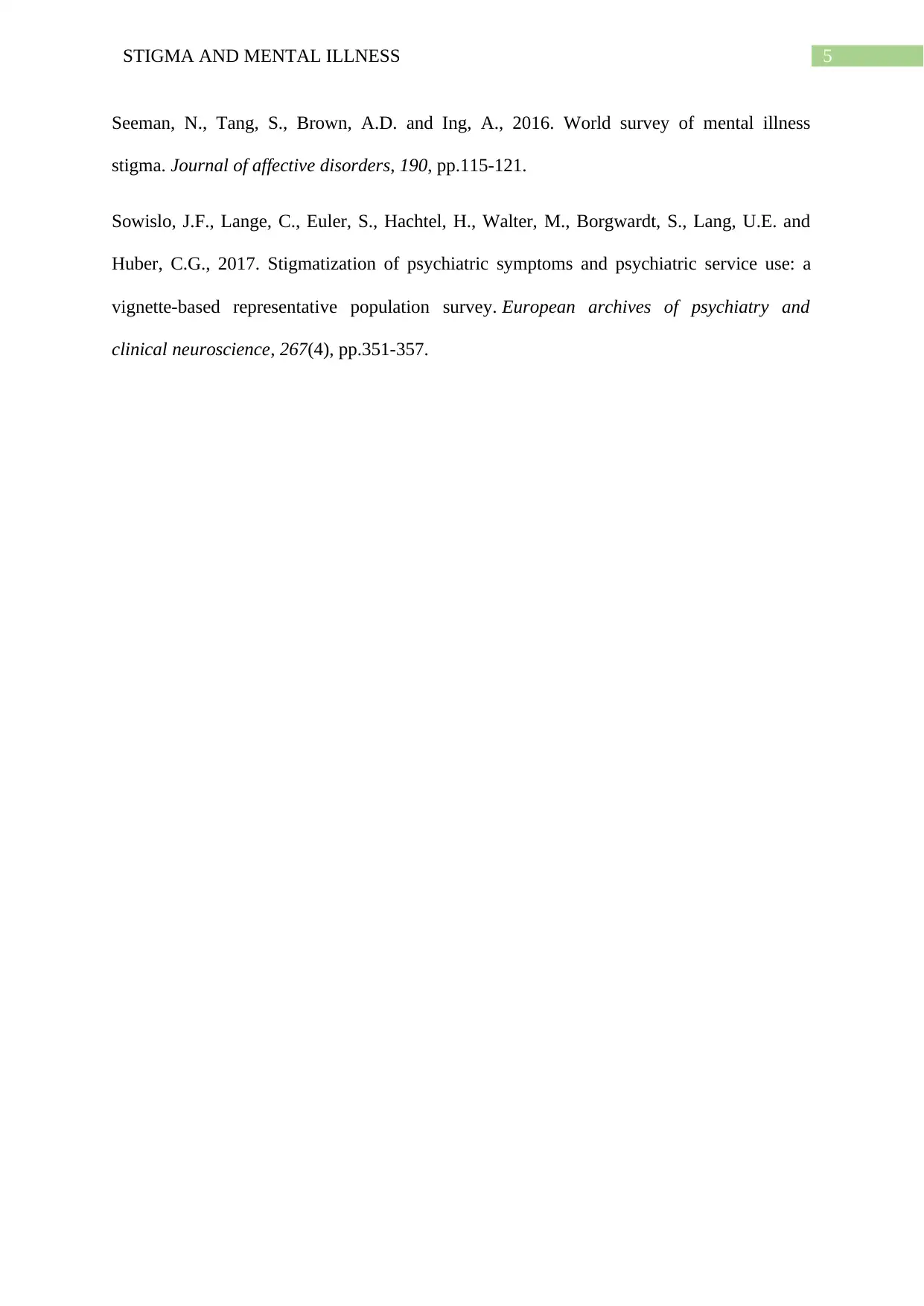
5STIGMA AND MENTAL ILLNESS
Seeman, N., Tang, S., Brown, A.D. and Ing, A., 2016. World survey of mental illness
stigma. Journal of affective disorders, 190, pp.115-121.
Sowislo, J.F., Lange, C., Euler, S., Hachtel, H., Walter, M., Borgwardt, S., Lang, U.E. and
Huber, C.G., 2017. Stigmatization of psychiatric symptoms and psychiatric service use: a
vignette-based representative population survey. European archives of psychiatry and
clinical neuroscience, 267(4), pp.351-357.
Seeman, N., Tang, S., Brown, A.D. and Ing, A., 2016. World survey of mental illness
stigma. Journal of affective disorders, 190, pp.115-121.
Sowislo, J.F., Lange, C., Euler, S., Hachtel, H., Walter, M., Borgwardt, S., Lang, U.E. and
Huber, C.G., 2017. Stigmatization of psychiatric symptoms and psychiatric service use: a
vignette-based representative population survey. European archives of psychiatry and
clinical neuroscience, 267(4), pp.351-357.
⊘ This is a preview!⊘
Do you want full access?
Subscribe today to unlock all pages.

Trusted by 1+ million students worldwide
1 out of 6
Related Documents
Your All-in-One AI-Powered Toolkit for Academic Success.
+13062052269
info@desklib.com
Available 24*7 on WhatsApp / Email
![[object Object]](/_next/static/media/star-bottom.7253800d.svg)
Unlock your academic potential
Copyright © 2020–2026 A2Z Services. All Rights Reserved. Developed and managed by ZUCOL.





